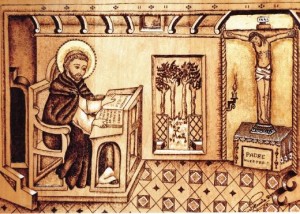On my commute home the other day, I heard an interview on the radio that Daniel Day-Lewis gave regarding his role in the movie “Lincoln.” I was struck by the length and depth he went to, in essence, become the man whom he portrays in the film.
Something Lewis said made me think that there may be a practical lesson here about the practice of spiritual reading as a way to better come to know Jesus. Take a look at the transcript from NPR,
“At a certain moment I choose to believe [that it’s a good approximation] because I need to believe. But that doesn’t mean that there’s no element of doubt lurking there.”
Day-Lewis used firsthand accounts of Abraham Lincoln’s speeches, along with his personal letters, to develop a voice and a style for Steven Spielberg’s biographical drama.
“Luckily with something of this kind, no one can categorically say that I didn’t [get it right] because there are no recordings, so there’s a great freedom there. But you take all the clues that you can. We have a number of contemporary accounts about the pitch of his voice, referring to the fact that he had a high-pitched voice or spoke in a fairly high register.
“That made complete sense because, as a stump speaker, he seemed to appear to be able to reach substantial crowds of people, and I — it seemed to me quite likely that a higher-registered voice would reach further. But, you know … you kind of break it all down. … [Y]ou have to allow your instincts to work as the pre-eminent source of most decisions. In other words, most decisions need to seem to make themselves.
“The thing that commonly I look for or listen for, and if I’m lucky, I hear, is the sound of a voice. And if it pleases me, if it seems right, I then set about trying to reproduce that voice, which is a whole other thing. You don’t necessarily manage to find that … with your own voice.
“I learned a few of my favorite passages of Lincoln’s, and I spoke his words every day and just kept trying to move towards a sense of familiarity with something that felt right.”
At that point, I was thinking to myself that this sounded a lot like what St. Anthony the Great would have been capable of. An illiterate himself, St. Augustine reminds us that Anthony,
a just and holy man, who, not being able to read himself, is said to have committed the Scriptures to memory through hearing them read by others, and by dint of wise meditation to have arrived at a thorough understanding of them.
Which again sounds like what the practice known as lectio devina is all about. Who better to explain the practice than the Carmelites?
Lectio Divina, a Latin term, means “divine reading” and describes a way of reading the Scriptures whereby we gradually let go of our own agenda and open ourselves to what God wants to say to us.
But wait, there is more.
The second stage is meditatio (reflection) where we think about the text we have chosen and ruminate upon it so that we take from it what God wants to give us.
The third stage is oratio (response) where we leave our thinking aside and simply let our hearts speak to God. This response is inspired by our reflection on the Word of God.
The final stage of Lectio Divina is contemplatio (rest) where we let go not only of our own ideas, plans and meditations but also of our holy words and thoughts. We simply rest in the Word of God. We listen at the deepest level of our being to God who speaks within us with a still small voice. As we listen, we are gradually transformed from within. Obviously this transformation will have a profound effect on the way we actually live and the way we live is the test of the authenticity of our prayer. We must take what we read in the Word of God into our daily lives.
For doing so is transformative and a way of prayer.
Much as studying speeches helped Daniel Day-Lewis transform himself into the character of Abraham Lincoln, the practice of lectio divina helps us conform our mind to the mind of Jesus. After all, it is said that Christ is present in every book of the Bible.
What better way is there to get a deeper understanding of Our God and King than to pray the scriptures in this manner?













